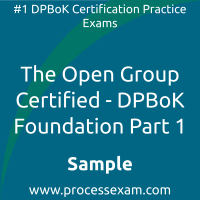 You have to pass the OGD-001 exam to receive the certification from Open Group. To increase the effectiveness of your study and make you familiar with the actual exam pattern, we have prepared this Open Group DPBoK Foundation Part 1 sample questions. Our Sample The Open Group DPBoK Foundation Part 1 Practice Exam will give you more insight about both the type and the difficulty level of the questions on the Open Group DPBoK Foundation Part 1 exam.
You have to pass the OGD-001 exam to receive the certification from Open Group. To increase the effectiveness of your study and make you familiar with the actual exam pattern, we have prepared this Open Group DPBoK Foundation Part 1 sample questions. Our Sample The Open Group DPBoK Foundation Part 1 Practice Exam will give you more insight about both the type and the difficulty level of the questions on the Open Group DPBoK Foundation Part 1 exam.
However, we are strongly recommending practice with our Premium The Open Group Certified - DPBoK Foundation Part 1 Practice Exam to achieve the best score in your actual Open Group OGD-001 Exam. The premium practice exam questions are more comprehensive, exam oriented, scenario-based and exact match of The Open Group DPBoK Foundation Part 1 exam questions.
Open Group DPBoK Foundation Part 1 Sample Questions:
01. Which of the following is a common challenge in transitioning from a traditional to a product-aligned organization?
a) Increased reliance on hierarchical decision-making
b) Reducing team autonomy to maintain control
c) Breaking down functional silos and fostering cross-functional collaboration
d) Eliminating customer feedback loops
02. How does Lean Product and Process Development differ from manufacturing-oriented Lean management?
a) It focuses solely on reducing costs.
b) It accounts for invisible work in process, such as knowledge work and ideation.
c) It eliminates iterative improvements.
d) It applies only to physical product development.
03. In a digital context, how does the perspective of a consumer differ from that of a sponsor?
a) Consumers use the product, while sponsors provide resources or funding.
b) Consumers focus on purchasing decisions, while sponsors focus on end-user experience.
c) Sponsors prioritize technical specifications, while consumers do not.
d) There is no difference between the two perspectives.
04. What does the term “service level” refer to in operations management?
a) The technical specifications of a system
b) The agreed-upon quality and availability standards for a service
c) The level of customer involvement in system design
d) The number of users a system can support
05. How are dependencies and coordination related in Agile processes?
a) Dependencies reduce the need for coordination.
b) Dependencies eliminate the need for team-level autonomy.
c) Coordination focuses solely on internal team workflows.
d) Coordination is required to manage and align team dependencies.
06. What is a major concern when assessing culture in digital organizations?
a) Over-reliance on metrics for evaluation
b) The need for alignment between organizational values and employee behaviors
c) Avoiding cultural change to maintain consistency
d) Eliminating diversity to streamline processes
07. Why is virtualization considered economically attractive in some cases?
a) It eliminates the need for software licenses
b) It requires no maintenance or operational oversight
c) It reduces hardware costs by consolidating workloads on fewer physical machines
d) It completely replaces the need for cloud computing
08. Which of the following is a data management function identified in the Data Management Body of Knowledge (DMBoK)?
a) Randomized data entry
b) Data governance and stewardship
c) Eliminating redundant systems
d) Manual reconciliation of data inconsistencies
09. What is progressive specification in backlog management?
a) Documenting all requirements upfront before development begins
b) Avoiding changes to backlog items after they are added
c) Refining and adding details to backlog items iteratively as development progresses
d) Using static prioritization methods for backlog management
10. Why is formalized process management necessary in large-scale Agile environments?
a) To eliminate flexibility in team processes
b) To provide a structured framework for managing dependencies and scaling workflows
c) To enforce top-down decision-making
d) To replace team autonomy with centralized control
Answers:
Question: 01
Answer: c |
Question: 02
Answer: b |
Question: 03
Answer: a |
Question: 04
Answer: b |
Question: 05
Answer: d |
Question: 06
Answer: b |
Question: 07
Answer: c |
Question: 08
Answer: b |
Question: 09
Answer: c |
Question: 10
Answer: b |
If you find any errors or typos in The Open Group Certified - DPBoK Foundation Part 1 (OGD-001) sample question-answers or online Open Group DPBoK Foundation Part 1 practice exam, please report them to us on feedback@processexam.com
 You have to pass the OGD-001 exam to receive the certification from Open Group. To increase the effectiveness of your study and make you familiar with the actual exam pattern, we have prepared this Open Group DPBoK Foundation Part 1 sample questions. Our Sample The Open Group DPBoK Foundation Part 1 Practice Exam will give you more insight about both the type and the difficulty level of the questions on the Open Group DPBoK Foundation Part 1 exam.
You have to pass the OGD-001 exam to receive the certification from Open Group. To increase the effectiveness of your study and make you familiar with the actual exam pattern, we have prepared this Open Group DPBoK Foundation Part 1 sample questions. Our Sample The Open Group DPBoK Foundation Part 1 Practice Exam will give you more insight about both the type and the difficulty level of the questions on the Open Group DPBoK Foundation Part 1 exam.